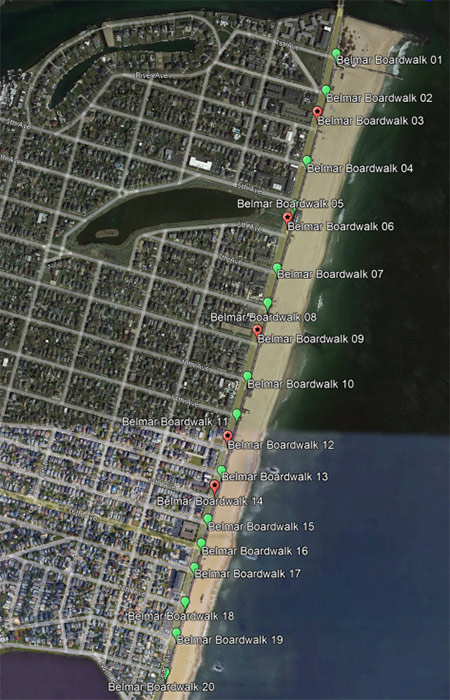
Verizon thought it was a done deal when a Belmar, New Jersey lawsuit was settled, offering 20 sites along a shoreline road to residents and guests, but Monmouth County has denied their request.
Verizon Wireless filed a lawsuit on September 7, 2023, against Monmouth County in New Jersey federal court, alleging the County wrongly rejected its applications to provide small cell site structures along the Borough of Belmar’s boardwalk based upon misapplied standards that were not supported by substantial evidence.
Verizon said that it initiated a discussion with Belmar approximately five years ago to deploy 20 small wireless facilities (SWFs) within the public right-of-way on Ocean Avenue that the County maintains.
Because Belmar did not respond within the FCC’s required shot clock period, Verizon filed suit. That litigation was settled in August 2022 with the following agreement.

Monmouth County said that the sites had to be breakaway poles. Verizon argued in its lawsuit that it should not be a requirement for approval.
Verizon then submitted an application to the county engineer on May 10, 2023, to install nine of the 20 sites in the settlement agreement.
In addition to approval from Belmar and the County, Verizon was required to obtain consent from the New Jersey Department of Environmental Protection (NJDEP) under the Coast Area Facilities Review Act (CAFRA).
The complaint states that without the County’s endorsement of the CAFRA application, Verizon is unable to make an application to the NJDEP for CAFRA approval.
They state the Catch-22 is that the County has adopted a set of regulations that only allow for issuing a road opening permit once all other state, local, and federal permits have been obtained.
Consequently, Verizon said it intended to apply for the necessary road permit after it had obtained CAFRA approval from the NJDEP and siting approval from the County pursuant to the ROW agreement.
Verizon said they were not informed of any missing information from either the SWF or CAFRA applications within ten days of filing.
Belmar is thrown county support in its opposition to the sites
Verizon claims that on May 8, 2023, a group of Belmar residents held a public meeting related to public opposition regarding Verizon’s proposed installations. A county commissioner reportedly attended the meeting and stated that the County would support the citizen group’s opposition to Verizon’s installation.
In addition, the lawsuit says that during an official meeting of the Belmar Council, a councilwoman stated that she had attended a meeting of the County Commissioners “and they expressed support for us.”
Verizon said that the County was required to take action on their applications by August 8, 2023, but they didn’t.
However on the same day the County’s counsel sent a letter to Verizon which stated: 1) there “is not an agreement between Monmouth County and Verizon;” 2) the ROW Agreement did not apply to SWFs that require the installation of new poles; 3) that the correct process for Verizon to follow was to obtain a road opening permit from the County; 4) because a road opening permit had not been submitted, the applicable FCC “shot clock” had not begun to run; 5) because the SFW Application “while not complying with Monmouth County’s usual procedure is also deficient,” same was therefore denied; and 6) that the County was not bound by Verizon’s settlement with the Borough of Belmar.
County engineer statements for denial are incorrect: Verizon
Verizon also stated that an attached letter from the county engineer included several “arbitrary and erroneous basis for denial of the SWF” and that he treated the ROW application as an application for a road opening permit.
Verizon objected in the complaint to the engineer’s statements for denial that included: 1) “any pole mounted equipment/cabinets shall not extend into or overhang pedestrian areas” despite the fact that the plans for the SWFs show that the poles are a “stealth design” in which all equipment is located internally within the pole, and 2) “poles shall be of a breakaway design and meet [Federal Highway Administration Standards] standards” despite the fact that (a) these standards have no applicability to a county road that is not a state or interstate highway and subject to federal jurisdiction, and (b) the weight of the proposed poles is approximately 2,000 lbs. and more than double the weight appropriate for breakaway pole designs.
The carrier is requesting that the court hear and decide their action for approval on an expedited basis.
County says it has hired legal counsel to protect Belmar from bullying
Last month, the County announced that it had retained Campanelli & Associates as legal counsel to fight against the structures that Verizon intends to put along Belmar’s beaches.
The Monmouth County Board of County Commissioners passed a resolution to retain legal counsel to draft an appropriate 5G network ordinance and separate counsel to file a motion to vacate a federal court order on September 8, 2022, as it relates to Monmouth County.
“Today we are passing a resolution to retain legal counsel regarding the proposed Verizon 5G monopoles in Belmar because the County of Monmouth was not a party to the litigation, Consent Order, or settlement agreement for the sites that are owned or controlled by the County,” said Commissioner Director Thomas A. Arnone. “The legal counsel will be tasked with drafting, noticing, and securing an ordinance about the locations, if necessary, of this unique technology throughout the County.”
Price Meese Shulman & D’Arminio, P.C. are representing Verizon.


















